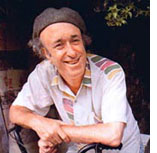By Dan Bloom

CHIAYI CITY, Taiwan — A native of Massachusetts, Stephen Siperstein is part of a national wake-up call about climate change studies and he is set to teach a course in the winter semester at the University of Oregon (UO) on the rise of the cli fi literary genre.
”Cli-fi” (novels and movies about climate change and global warming) is growing in popularity and notoriety as a pop culture genre, and has become an important part of climate change education efforts, particularly at the college level.
In a recent email exchange, Siperstein, spoke about his work with this San Diego Jewish World correspondent. Siperstein is a currently a PhD. candidate in the UO English department and earlier attended Wesleyan University for his undergraduate degree and then Boston College for his masters degree (with both degrees in English).
“I am currently living in Eugene and sat in on Stephanie LeMenager’s climate change cultures seminar at UO during the winter term last year,” he said. “I am writing my dissertation on climate change culture, with a focus on cli-fi,” he added.
Last April, Siperstein’s ongoing work with the cli fi genre was featured in an article in the New York Times. He told Times reporter Richard Perez-Pena, who covers the national higher education beat for the New York newspaper, that he recalled showing the documentary “Chasing Ice” about disappearing glaciers to a class of UO undergraduates last winter, ”leaving several of them in tears.”
This coming winter semester, starting in early January, Siperstein will be teaching a new class on cli fi literature for UO undergraduate students –most of them majoring in subjects other than English.
When asked if he felt that cli fi can change minds, even at the national level of politics, he replied:
“Yes, climate change stories, no matter what form they take–novels, poetry, film–can change minds, but in the best cases, they can also change hearts by working on an emotional level.”
“One way climate change stories and cli-fi in particular do that is by opening space for readers to consider how climate change affects them and the things and places that they love.”
And when I asked him what writers and movie directors should avoid if they want to reach audiences with cli fi messages, he said: “I don’t think there is anything to avoid, nor would I want to proscribe what kinds of stories authors and artists should tell.”
“The cultural sphere is an ecosystem, and the more diversity of climate change stories we have, the better,” he added. “I will say, though, that it is important that climate change stories and cli-fi in particular are democratic; that is, everyone needs opportunities to tell their climate change stories, not just those with cultural or political power.”
*
Bloom, based in Taiwan, is an inveterate web surfer who develops stories from all over the globe. He may be contacted via dan.bloom@sdjewishworld.com
Zack Y. writes: Now we have “Climate Fiction”? The operative word here is ‘fiction’. Bring it on. I want to see some balance in the material, however. How about some stories with corrupt politicians and hucksters who’ve used these issues as a means to acquire tyrannical power over the citizenry? Or maybe a story in which people discover that the climate predictions are massively inaccurate (no disaster is coming anytime soon), but are suppressed because all the money- and hence political influence- has now come to rest in ‘green’ industry?
Even the solutions that many ideologues consider ‘perfect’ for things like climate change will have negative unintended consequences. Ideally fiction and other efforts will try to map out as many possible
trade offs and knock-on effects as possible, instead of just writing thinly veiled propaganda for one faction of the debate.
Pingback: Climate-Change Fiction Class To Be Taught At University Of Oregon